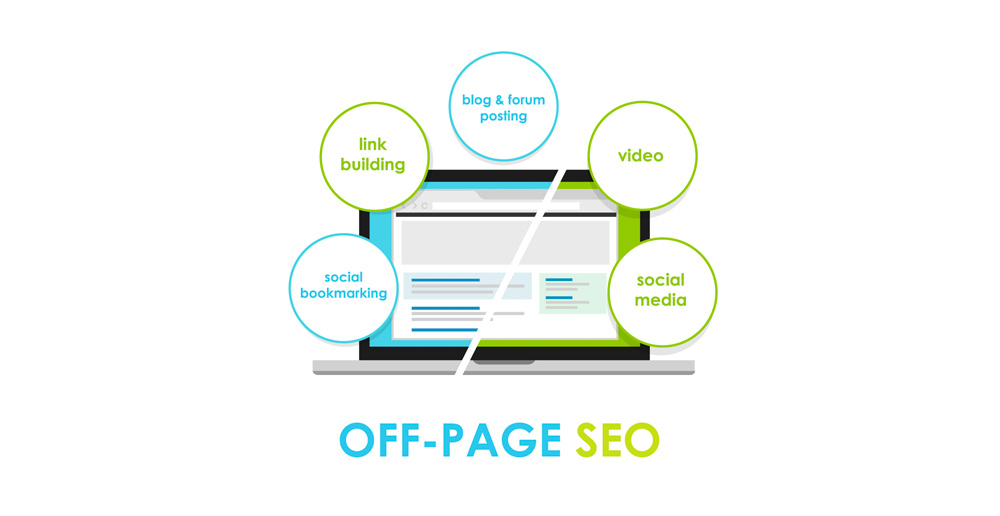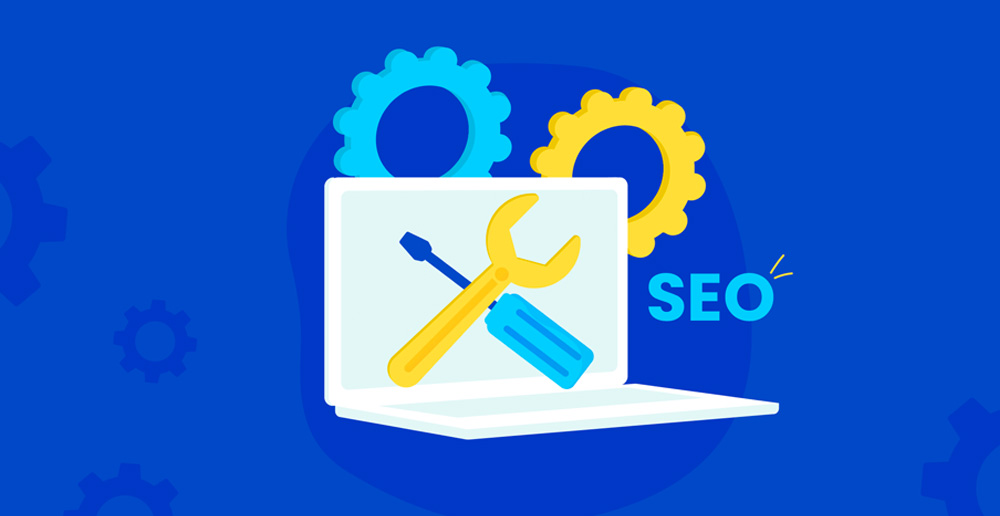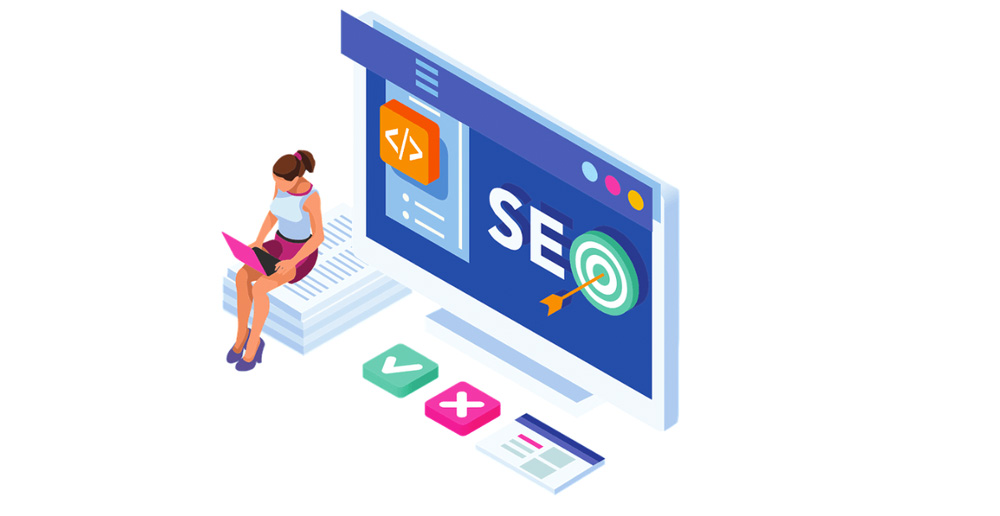Search Engine Optimisation (SEO) is the practice of optimising your website and its content to rank higher in search engine results pages (SERPs). There are many different types of SEO, but in this blog post, we will discover the four types of SEO and learn how these can helo optimise your website.
1. On-Page SEO

On-Page SEO refers to the optimisation of the content on your web pages. This includes elements such as your website’s title tags, meta descriptions, header tags, content, and images. On-Page SEO is crucial because it helps search engines understand what your website is about and what your content is relevant to.
Title tags and meta descriptions are two of the most important on-page SEO elements. Your website’s title tag appears at the top of the browser window and in the search engine results pages (SERPs). It should accurately describe the content on that page and include the keywords you are targeting. Meta descriptions are the short summaries that appear under the title tag in the SERPs. They should also accurately describe the content on the page and include your target keywords.
Header tags, such as H1, H2, and H3, are important for organising your content and making it more readable for both search engines and users. H1 tags should be used for the main title of your page, while H2 and H3 tags can be used for subheadings.
Content is also important for on-page SEO. Your content should be high-quality and relevant to the keywords you are targeting. It should be well-written and easy to read, with proper grammar and spelling. Your content should also be structured with appropriate subheadings and bullet points to make it more readable.
Finally, images on your website should be optimised for search engines. This includes using descriptive file names, alt tags, and captions that include your target keywords.
2. Off-Page SEO

Off-Page SEO refers to the optimisation of your website’s external factors, such as backlinks and social media activity. Backlinks are links from other websites that point to your website. They are important because they show search engines that other websites consider your content to be valuable and relevant.
The quality of the backlinks you receive is more important than the quantity. High-quality backlinks are from websites that are relevant to your niche and have a high domain authority. Low-quality backlinks, on the other hand, are from spammy websites and can actually hurt your search engine rankings.
Social media activity is also an important factor in off-page SEO. When people share your content on social media, it can lead to more backlinks and increased traffic to your website. Social media activity also shows search engines that your content is valuable and relevant to your audience.
3. Technical SEO

Technical SEO refers to the optimisation of your website’s technical elements. This includes things like website speed, mobile-friendliness, and website architecture. Technical SEO is important because it helps search engines crawl and index your website more effectively.
Website speed is an important factor in technical SEO because it affects user experience. If your website takes too long to load, users are likely to leave and go to another website. Slow website speed can also hurt your search engine rankings. To improve website speed, you can compress images, minify CSS and JavaScript files, and use a content delivery network (CDN).
Mobile-friendliness is also important for technical SEO. More and more people are accessing the internet from their mobile devices, so it’s crucial that your website is optimised for mobile. This includes using responsive design, which adjusts the layout of your website based on the size of the screen it’s being viewed on.
Website architecture is another important factor in technical SEO. Your website’s architecture should be easy to navigate, with clear categories and sub pages. This makes it easier for both users and search engines to find the content they’re looking for. Your website’s structure should be organised logically, with a clear hierarchy of pages and categories. This can be achieved by using a clear menu structure and internal linking.
In addition, technical SEO also includes the use of structured data, which is a standardised format for providing additional information about your content to search engines. Structured data can help search engines understand your content better, which can lead to rich snippets and other enhanced search results.
4. Local SEO

Local SEO is the practice of optimising your website and online presence to rank higher in local search results. Local search results are the listings that appear when someone searches for a business or service near their location. For example, if someone searches for “Italian restaurant near me,” the search engine will display a list of Italian restaurants near their location.
Implementing Local SEO is important for businesses that have a physical location or provide services to a specific geographical area. It can help these businesses reach more customers in their local area and increase foot traffic to their physical location.
There are several key factors that influence local search rankings. These include:
Google My Business listing
Google My Business (GMB) is a free tool that allows businesses to manage their online presence across Google, including search and maps. It’s important to claim and optimise your GMB listing with accurate and up-to-date information such as your business name, address, phone number, business hours, and photos.
NAP citations
NAP stands for Name, Address, and Phone number. Consistent and accurate NAP citations across the internet (such as on directories and social media profiles) can help improve local search rankings.
Online reviews
Positive online reviews from customers on Google, Yelp, and other review sites can help improve your local search rankings.
Local content
Creating high-quality, locally-focused content on your website can also help improve your local search rankings. This could include blog posts, landing pages, or other types of content that address local topics or issues.
Local link building
Earning links from local websites can also help improve your local search rankings. This could include local news websites, community organisations, or other local businesses.
By optimising these factors, businesses can improve their chances of appearing in the top results for local searches in their area. Local SEO can be a complex and ongoing process, but it can provide significant benefits for businesses looking to attract more local customers.
Give your website the optimisation it deserves today
In conclusion, SEO is a complex and multi-faceted discipline that requires a combination of on-page, off-page, and technical optimisation techniques. On-page SEO involves optimising the content on your website’s pages, including title tags, meta descriptions, header tags, content, and images. Off-page SEO involves optimising external factors such as backlinks and social media activity. Technical SEO involves optimising the technical elements of your website, such as website speed, mobile-friendliness, and website architecture. Local SEO helps businesses be more visible in local search results Any business with a physical location or serves a geographic area can benefit from local optimisation. By implementing these four types of SEO, you can improve your website’s visibility in search engine results pages and drive more traffic to your site.
Interested in finding out more about how-to implement SEO strategies on your website? Discover how our SEO agency can help your business website achieve more traffic and sales today.


